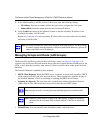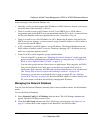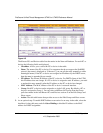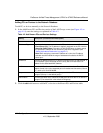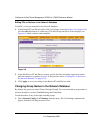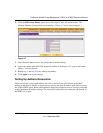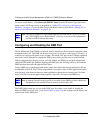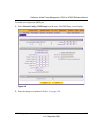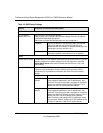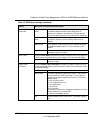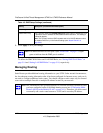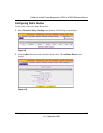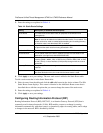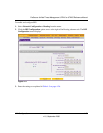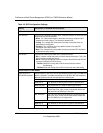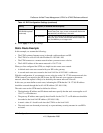
ProSecure Unified Threat Management UTM10 or UTM25 Reference Manual
4-20 LAN Configuration
v1.0, September 2009
Table 4-3. DMZ Setup Settings
Setting Description (or Subfield and Description)
DMZ Port Setup
Do you want to
enable DMZ Port?
Select one of the following radio buttons:
• Yes. Enables you to configure the DMZ port settings. Enter the IP address
and Subnet Mask fields (see below).
• No. Allows to disable the DMZ port after you have configured it.
IP Address Enter the IP address of the DMZ port. Make sure that the
DMZ port IP address and LAN port IP address are in
different subnets (for example, an address outside the LAN
address pool, such as 192.168.1.101).
Subnet Mask Enter the IP subnet mask of the DMZ port. The subnet mask
specifies the network number portion of an IP address.
DHCP
Disable DHCP Server If another device on your network is the DHCP server for the VLAN, or if you will
manually configure the network settings of all of your computers, select the
Disable DHCP Server radio button to disable the DHCP server. This is the
default setting.
Enable DHCP Server Select the Enable DHCP Server radio button to enable the UTM to function as
a Dynamic Host Configuration Protocol (DHCP) server, providing TCP/IP
configuration for all computers connected to the VLAN. Enter the following
settings:
Domain Name This is optional. Enter the domain name of the UTM.
Starting IP
Address
Enter the starting IP address. This address specifies the first
of the contiguous addresses in the IP address pool. Any
new DHCP client joining the LAN is assigned an IP address
between this address and the Ending IP Address. The IP
address 192.168.1.2 is the default start address.
Ending IP
Address
Enter the ending IP address. This address specifies the last
of the contiguous addresses in the IP address pool. Any
new DHCP client joining the LAN is assigned an IP address
between the Starting IP address and this IP address. The IP
address 192.168.1.100 is the default ending address.
Note: The starting and ending DHCP IP addresses should
be in the same “network” as the LAN TCP/IP address of the
UTM (the IP address in LAN TCP/IP section above).



